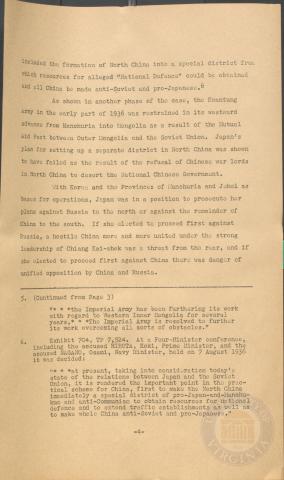
Page 4
| Parent | Japanese - German - Italian Collaboration |
|---|---|
| Date | |
| Language | English |
| Collection | Tavenner Papers & IMTFE Official Records |
| Box | Box 14 |
| Folder | Japan, Germany, Italy Collaboration and Introduction |
| Repository | University of Virginia Law Library |
included the formation of North China into a special district froiL which resources for alleged "National Defence" could be obtained and all China be made anti-Soviet and pro-Japanese.^
As shown in another phase of the case, the Kwantung Army in the early part of 1936 was restrained in its westward advance from Manchuria into Mongolia as a result of the Mutual Aid Pact between Outer Mongolia and the Soviet Union. Japan's plan for setting up a separate district in North China was shown to have failed as the result of the refusal of Chinese war lords in North China to desert the National Chinese Government.
With Korea and the Provinces of Manchuria and Jehol as bases for operations, Japan was in a position to prosecute her plans against Russia to the north or against the remainder of China to the south. If she elected to proceed first against Russia, a hostile China more and more united under the strong leadership of Chiang Kai-shek was a threat from the rear, and if she elected to proceed first against China there was danger of unified opposition by China and Russia.
5.(Continued from Page 3)
»* * *the Imperial Army has been furthering its work with regard to Western Inner Mongolia for several years,* * *The Imperial Army is resolved to further its work overcoming all sorts of obstacles."
6.Exhibit 704, TP 7,524. At a Four-Minister conference, including the accused HIR0TA, Koki, Prime Minister, and the accused NAGANO, Osami, Navy Minister, held on 7 August 1936 it was decided $
ti* * present, taking into consideration today's state of the relations between Japan and the Soviet Union, it is rendered the important point in the prac¬tical scheme for China, first to make the North China immediately a special district of pro-Japan-and-Hanchu- kuo and anti-Communism to obtain resources for national defence and to extend traffic establishments as well as to make whole China anti-Soviet and pro-Japanese."
